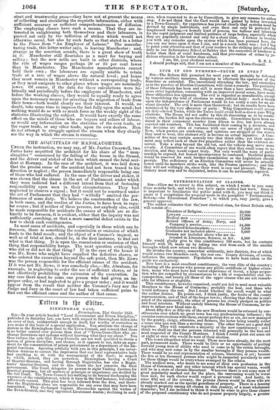Itttrro to tit elfin.
BIRMINGHAM GAOL.
Birmingham, 31st October 1853. Sin—In your article beaded "Local Government and Prison Discipline," published on Saturday last, you have with respect to Birmingham fallen into an error of fact, unimportant enough in itself, but worthy of correction as you make it the basis of a special application. You attribute the change of system in the Birmingham Gaol to the Town-Council, and remark that there is no better control over prisons than that of "Town-Councillors who ex- change Governors and systems without knowing what they are about." You then enforce the rule that Town-Councils are not well qualified to devise a system of prison discipline, and thence, as it appears to me, infer an argu- ment for the concentration of prison government as a department of the Im- perial functions. Agreeing cordially with you in this principle, I am never- theless desirous to correct the impression that our local representative body had anything to do with the management of the Gaol ; in respect to which, indeed, they are powerless. Birmingham having a Court of Quarter-Sessions, and having Borough Magistrates, has also a Magis- trates' Quarter-Sessions, and to this Court the law commits the Gaol government. The Court delegates its powers to eight Visiting Justices for practical purposes, but all matters of principle or importance are decided by the full Court. The Town-Council has nothing to do beyond discharging the expenses of the establishment, which it fixes in the first instance, but cannot afterwards control. This plan has been followed from the first, and there- fore the Magistrates alone are responsible for any error that may have been committed. They discharged Captain Maconochie against the wishes of the Town-Council, and they appointed Lieutenant Austin ; declining in each case, when requested to do so by Councillors, to give any reasons for either step. I do not think that the Gaol would have gained by being intrusted to a Town-Council; for experience has proved clearly that systems must be devised by single individuals, and even then can only be perfected by lengthened working,—a homely kind of process, too tedious and laborious for the rapid judgment and limited patience of large bodies, especially when they are popularly elected and only for a short time. I forbear to trouble you with any remarks upon the system which has been pursued here, for you can say more upon it than I can, and in a much better 'way; but I beg to point your attention and that of your readers to the striking proof afforded daily in our Reformatory School at Saltley that the corrective of kindness is better than that of cruel harshness, and that prevention of crime by ju- dicious education is far better than either.
I am, Sir, your obedient servant, B. S. J. I should perhaps add, that I am not a member of the Town-Council.


























 Previous page
Previous page